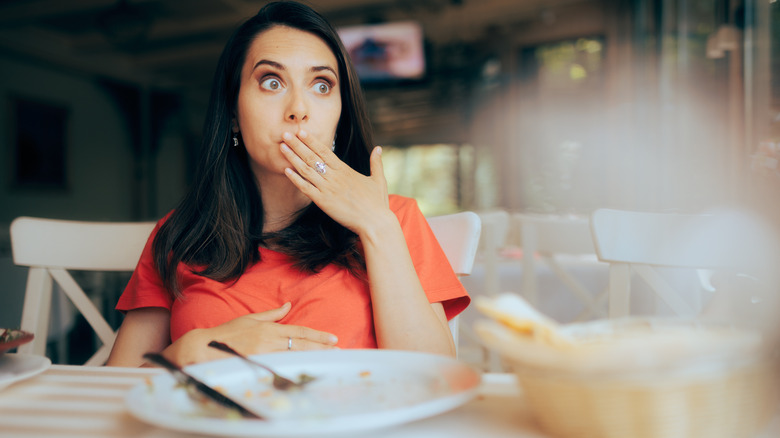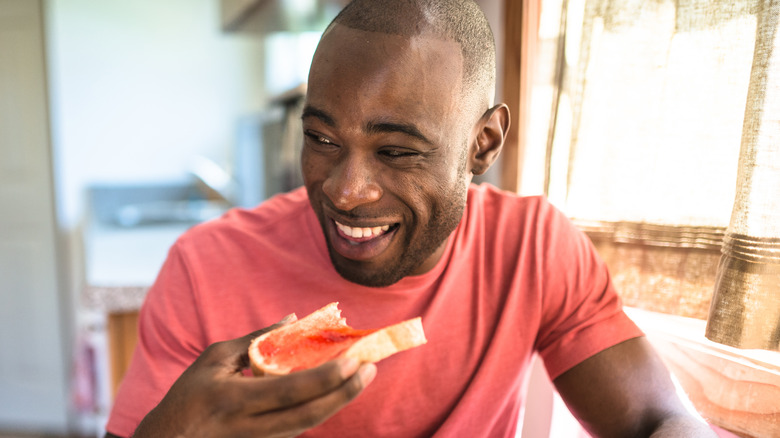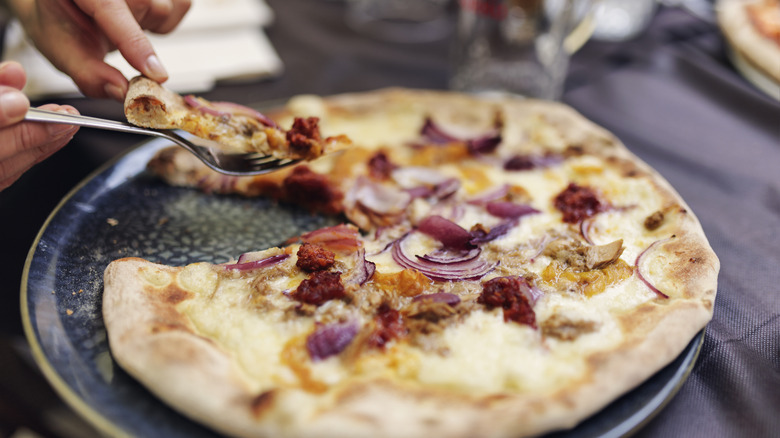Eating This Popular Carb Could Trigger An Annoying Case Of The Hiccups
Chugging a large carbonated soda isn't the only way to trigger a bout of irritating hiccups. Rather, hiccups can be activated by any number of things, some of which you may never have expected. This includes pregnancy, stress, drinking too much alcohol, and even strong, smelly odors (via Better Health Channel).
The source of that "hic" sound emanating from your throat can be traced down to our diaphragm. This curved muscle sits underneath the lungs and is essential to our ability to breathe. When the diaphragm experiences involuntary muscle spasms, it prompts us to inhale. This abrupt suction of oxygen into our lungs causes the tissue covering our windpipe to close up tight, which is what produces that annoying "hic" noise we know all too well.
Most of the time, we only have to endure the misery of hiccups for a few minutes, after which time they tend to subside on their own. Even so, we do what we can to avoid them at all costs. If you're a fan of bread, however, you may not realize that you're welcoming a bout of hiccups with open arms.
We swallow more air when chewing bread
Exactly why certain things send the diaphragm into a state of spasming is not entirely understood. However, Ali Seifi, a neuroscientist at the University of Texas Health at San Antonio, told The Washington Post that bread can be one of these things. " ... A large meal of dry foods such as pasta or bread can trigger a muscle in our belly called the diaphragm," Seifi stated.
A number of factors may contribute to this. For one, Healthline explains that because bread is a dry food, it can tickle and aggravate our throat more so than soft foods. Soft foods are also easier to chew, and they tend to go down a little easier than dry foods. More chewing is involved with bread than, say, mashed potatoes, for instance. The more we chew, the more air we ingest, thereby increasing the likelihood of hiccups. We often consume dry foods in larger chunks, too. These larger pieces can cause abdominal bloating, which also primes us for the hiccups.
Eating habits to help prevent hiccups
Although there is no confirmed scientific method for doing away with the hiccups, there are several DIY methods worth trying. Experts at Better Health Channel suggest inhaling and exhaling into a paper bag, deep breathing exercises, sucking on a lemon slice, gargling, or eating ice, amongst other remedies.
When it comes to eating-related hiccups specifically, Healthline suggests altering your eating habits to protect against bloating and throat irritation. This includes avoiding trigger foods, eating smaller amounts of food, and refraining from talking while chewing (as this can cause us to swallow greater amounts of air).
Alternatively, the next time you go out to eat and enjoy that warm bread-basket appetizer, maybe keep a HiccAway Straw on hand. Seifi, the inventor of the device, told The Washington Post that this straw-like gadget is designed to stop hiccups in their tracks. When users sip on the straw, it prompts their diaphragm to flex. This, combined with the swallowing of their beverage, causes the throat to relax. As a result, you can say an enthusiastic "sayonara!" to those annoying hiccups.



